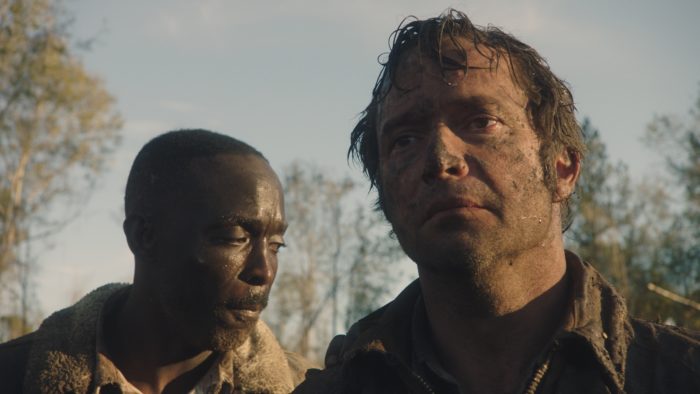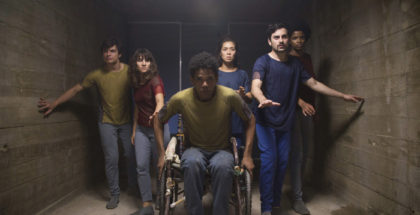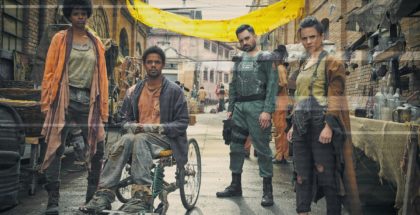Amazon UK TV review: Hap and Leonard Season 3, Episode 5 and 6 (spoilers)
Review Overview
Hap and Leonard
10Hatred and hope
10Purefoy and Williams
10David Farnor | On 19, Jun 2018
Warning: This contains spoilers. Not caught up with Hap and Leonard? Read our spoiler-free review of Season 3.
“Hate makes you blind. Love sets you free. And hope breaks your heart.”
Those are the words that close out Season 3 of Hap and Leonard – and the final ever episode of Sundance TV’s absolutely tremendous adaptation of Joe R Lansdale’s books. The fact that its last words could easily be talking about the world in 2018 is testament not only to Lansdale’s timeless portrait of friendship and prejudices, but also the writing by Nick Damici and Jim Mickle, whose understanding of these characters – and ability to bring out their relevance to today without losing subtlety and nuance – has never been more powerful.
Part of Hap and Leonard’s poignant impact and stirring inspiration has always been the way it finds fresh obstacles to pit our underdogs against. They’re bruised, battered and bewildered by the world, but they keep soldiering on – not for the sake of the world, but for the sake of each other.
Season 3, though, has found them facing perhaps the most disturbing challenge of all: widespread, systemic racism that can’t be easily uprooted or exposed, because it’s become normal. At least, it has in Grovetown. And so, when our pair go back into town to find Florida once and for all, they wind up in a showdown in the local diner with Truman Brown (Pat Healy) and his gang. Here we go, we think, as our antiheroes use their hangdog, heavy-hitting fighting style to scrap their way out on top – diner owner Bacon (Louis Gossett, Jr.) even gets the chance to verbally stand up to Truman.
Stepping outside into the nearby alley, though, Hap (James Purefoy) and Leonard (Michael Kenneth Williams) realise that they’re far from out of dodge – and, surrounded by evil in its most mundane form, they end up losing the hardest they ever have. It’s a beatdown, violent and simple, an ugly pile-on that sees Leonard come centimetres away from death. For Hap, looking on, it’s a devastating thing to witness – and yet what makes Hap and Leonard such a remarkable TV show is that it still finds nuanced areas to explore within that moment. Hap realises, as his best friend is nearing expiry, that he’s glad, in a way, that it’s not him being killed in broad daylight – if it has to be one of them, at least it’s the other guy.
The only thing more surprising than that revelation is who Hap chooses to divulge it to: Charlie Blank. Douglas M. Griffin emerges in these final chapters as a hugely underrated, deceptively complex figure, who is hardly a hero – he is, effectively, enabling the racism of Officer Reynolds (Lauren Allen) – but is also a strangely supportive ally, one who has grown to respect both Hap and Leonard, and encourages the pair to move past their rift and join together again.
“We good?” are the only two words these two veterans need to patch things up, but the season’s penultimate episode takes its time getting there, which means we also get to watch Leonard and Bacon have a heart to heart. Recovering at Bacon’s home, Bacon explains to Leonard that he’s doing his best to serve the Southside community by bringing it the healthcare it needs – he’s not selling out, standing by and letting evil happen, or cheering it on, he’s just trying to do the right thing. He’s a mellowed Leonard, a wiser, calmer man who still has that same strain of anger and frustration, still, even in his old age, suffering discrimination and abuse at the hands of the white townfolk around him.
That abuse is running rampant, and only promises to do more so once Reynolds shoots Chief Cantuck and promptly takes his position as head of the local police. The ensuing shootout is a thrilling burst of action, but it’s one that lays the groundwork and foreshadows the action to come in the finale – action that proves to be just as visually stylish, but far more heart-wrenching.
With Reynolds seen off for now, the pair continue their investigation into Florida’s whereabouts, determined not only to get their mojo back by avenging Leonard’s beating but also to find Hap’s beloved and close this chapter once and for all. Listening to her tape yields a mechanical noise that suggests Truman’s Christmas tree farm – a destination that holds fresh fear and danger for Leonard. But it’s actually a noise from the junkyard, one that makes us realise that Florida’s been trapped somewhere entirely unexpected this whole time.
A flashback reveals what happened: Tim the mechanic found the fabled music tapes and tried to bargain with Florida, who naturally refused and then rejected his violent advances, knocking him out. But a faulty sign dropped and knocked her out cold, prompting Tim to hide her in the boot of a car. It’s an underwhelming answer to the mystery, but also one that smacks of the unfortunate luck of these characters, in a world where things are always stacked against them – life is cruel, arbitrary and rarely fair. And so Hap and Leonard head to Sonny’s radio station (Andrew Dice Clay remains enjoyably snivelly) and they broadcast a message for Truman to meet them for a showdown. All the while, Florida has been banging on a car boot in the rain, desperate to get free – and, sure enough, they eventually release her, proving that there is reason to dream of happy endings after all.
But first, that showdown. Taking place in a stunning downpour, it’s a gorgeously intense set piece that lingers on the simple tension of people pointing weapons at each other with a desperate desire for justice. Truman is the one to get it, after he insults Bacon and calls him “Boy” just one more time – the fact that it’s Bacon who shoots Truman makes for a hugely cathartic outburst, just as it’s rewarding to see Sneed take out Reynolds, who, in turn, shoots Tim as she falls to the ground.
And yet. And yet. Life is not that easy, and so a portentous flood strikes the town, an existential piece of karma to wash the sins and prejudices of this Bible-loving parish away – a piece of pathetic fallacy that feels entirely apt after such a righteously sickening season of racism. While Hap and Leonard scramble to safety, though, Florida doesn’t make it, and they ultimately find her dead on a tree. It’s a horrific revelation, one that leaves you wishing Tiffany Mack had more screen-time this season (although she certainly made her part more than a fridged corpse – not bad going, given many of her scenes were hallucinations or flashbacks) and one that leaves you pining, once again, for Hap Collins.
James Purefoy’s performance is the stuff that awards are made of, and he invests his redneck, gold-hearted working man with such downbeat grace and endearing sadness that you half want to hug him and half want to go chop wood with him in a forest. Williams, as ever, is the perfect foil. We’ve seen in this season Pine pushed to breaking point further than ever, and his unexploded-landmine anger balanced with his astonishing patience has been superbly portrayed by The Wire star. But we’ve also seen the toll it’s taken on both Hap and their relationship. The pair still click and chime but now also conflict with each other, all of which carries a lived-in quality that feels like a pair of warm slippers.
“They ain’t always get their shit together, but by god, you can always count on them,” observes one character during this closing double-bill, and it’s that ever-lasting bond that has been so lovingly portrayed over these 18 episodes. In the face of blind hatred, Hap and Leonard has repeatedly reminded us that love can see us free – even with the loss of Florida, we know Leonard will be there to help his brother overcome it. The hope of spending more time enjoying empathy in its purest form is what keeps you coming back to watch and re-watch this miniature masterpiece. Knowing that there won’t be any more seasons? That’s what really breaks your heart.
Hap and Leonard Season 3 is available exclusively on Amazon Prime Video, as part of a £5.99 monthly subscription.




















